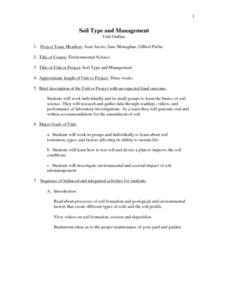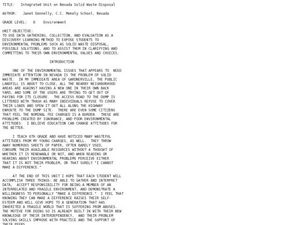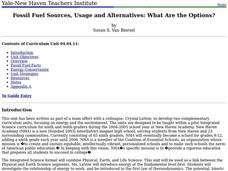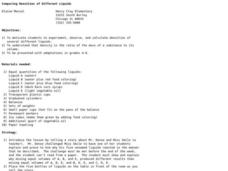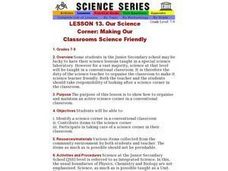Curated OER
Soil Type and Management
Students study the basics of soil science. They research and gather data through readings, videos, and performance of laboratory investigations. As a team they generate oral and written recommendations for the amendment of soil.
Teach Engineering
Solar Power
Elementary schoolers discover how engineers use solar energy to heat buildings. They take a close look at some of the materials used: sand, salt, water, and shredded paper and evaluate the efficiency of each material. An incredible...
Virginia Department of Education
Chemical Bonds
How are chemical bonds similar and how are they different? Provide your young chemists with the resources to more thoroughly understand the concepts of ionic and covalent bonds. Pupils research these topics, diagram examples of each...
Curated OER
The Greenhouse Effect and Me: How Do We Affect Each Other?
Ninth graders create a model of greenhouse effect in the lab. In this integrated science lesson, 9th graders investigate the different variables affecting this condition. They research about global warming and prepare a PowerPoint...
Curated OER
Arctica - An Interactive Mystery
Rumours of illness, poisoning, and madness - a ship disappears without a trace! Read this interactive science story and use deductive reasoning skills to solve a mystery. This engaging resource gives science stars a chance to practice...
US Navy
The Science of Diving
Introduce gas laws using the popular topic of SCUBA diving. This activity makes a connection between the gas laws and the effect of pressure and temperature changes during diving. Young engineers complete introductory experiments to...
National Park Service
Pulley Systems Used at Fort McHenry
What a great opportunity to integrate science into your lesson on the War of 1812! Discover how pulley systems were used to move 1,000 lb. cannons at the Battle of Fort McHenry, and to raise the flag that would inspire Francis Scott Key...
Georgia Aquarium
The Ocean's Nursery
Linear perspective, estuaries, and water ways converge in a science-inspired art project. The class uses what they've learned about eco-systems, estuaries, and the food chain to create scale models of a local marsh. While the lesson is...
Curated OER
Investigating Factors That Affect Cell Membrane Permeability
Cell membranes and the factors that affect its integrity are studied, with Beet tissue used as the model. A poster to display findings of the permeability of the membranes would clarify understanding and also allow a layer of language...
Curated OER
Science TV: Making it Real
Students explore the ways science is presented in a children's television show. Students conduct internet research, and then create and design a skit that highlights the problem-solving process.
Curated OER
Integrated Unit on Nevada Solid Waste Disposal
Sixth graders examine how to gather and interpret data, accept responsibility for the environment, and demonstrate an interest in making a difference in this series of lessons.
Curated OER
Global Warming and Hurricanes: Is an Increase in the Number of Stronger Hurricanes an Indicator of Global Warming
Ninth graders investigate whether stronger hurricanes are signs of global warming. In this environmental science lesson, 9th graders research both sides of the issue about global warming. They debate for or against this issue in class.
Curated OER
Fossil Fuel Sources, Usage and Alternatives: What are the Options?
Students identify the different sources of fossil fuels. In this environmental science lesson, students research about how these impact our environment. They explore renewable energy sources that could replace fossil fuels.
Curated OER
Comparing Densities of Different Liquids
Students experiment with a variety of liquids to calculate density. In this integrated science and math instructional activity, students listen to a story in which the characters must prove and explain why 5 "mystery" liquids react in a...
Curated OER
Our Science Corner: Making Our Classrooms Science Friendly
Students prepare and care for a classroom science corner. In this science activity, students contritubute items to the classroom science corner, and invite other classes of students into their room to share their scientific items.
Curated OER
Applied Science - Science and Math Pre - Lab (Scientific Method)
Young scholars examine science. In this scientific method lesson, students are introduced to what every experiment contains (hypothesis, critical thinking) and how an experiment is conducted. They watch a demonstration and then work...
Curated OER
The Physics of Flight
Three activities allow young flight engineers to understand the 4 principles of flight (weight, lift, thrust, and drag), to construct a glider, and to create a propeller. Multicultural history and literature are integrated by reading...
Kenan Fellows
Half-Life
Scholars shake their way to understanding half-life with the help of candy. They observe and record which side candy lands on to graph the exponential decay in the fifth lesson plan of seven integrating chemistry and algebra. Combining...
Curated OER
Fueling Extreme Weather
First graders identify the different stages in the hydrologic cycle. To study earth science, they investigate how sunlight affects the earth's temperature. They also discuss how the sun's energy is transformed.
Baylor College
Why Is Water Important? Pre-assessment
This water worksheet is just the tip of the iceberg! It a multiple-choice quiz meant to be a pre-assessment for a wonderful water unit. There are 10 questions to be answered regarding the role, properties, and behavior of water. Make...
Baylor College
How Much Water Do Humans Need?
Physical or life science learners measure the amounts of water eliminated by intestines and the urinary system, and the amounts lost via respiration and perspiration. In doing so, they discover that the body's water must be replenished...
Baylor College
Plant Parts You Eat
Plants provide a variety of delicious foods essential for human survival. In the fourth lesson of this series on food science, young scientists investigate common fruits, vegetables, and grains in order to determine which plant part is...
Baylor College
Bio Build-up
Trace pollutants through the environment in the seventh lesson of this series on the science of food. Looking at a picture of the plants and animals in an aquatic ecosystem, learners use dot stickers to represent harmful chemicals as...
Baylor College
They're Everywhere: Bacteria
Totally gross out your class with the eighth lesson plan in this series on food science. Explore the microscopic world of bacteria by taking swabs of different classroom objects and growing colonies in petri dishes. An engaging activity...
Other popular searches
- Integrated Science and Math
- Integrated Science Units
- Integrated Science Sose
- Integrated Science and Art
- Integrated Science Lessons
- Integrated Science Inquiry
- Integrated Science Souse
- Integrated Science and Health
- Science Integrated With Math
- Math Integrated Into Science


